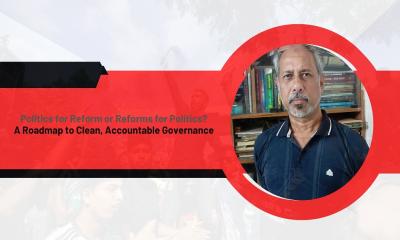Ever since the US Secretary of State, Anthony Blinken, announced a new visa policy in Bangladesh on May 24, 2023, it has dominated the political discourse of the country. The core of the policy is that, “the United States will be able to restrict the issuance of visas for any Bangladeshi individual, believed to be responsible for, or complicit in, undermining the democratic election process in Bangladesh”.
The Awami League (AL), which has been in power since 2009, has said the new visa policy is aimed at the Bangladeshi Nationalist Party (BNP). But a recent declaration that the AL was willing to sit down with UN mediation, seems to indicate very clearly that the AL is the primary focus of the effort. The visa policy was a personal setback for the Bangladeshi prime minister, Sheikh Hasina, who had been campaigning against the dropping of US sanctions against the Rapid Action Battalion (RAB), credibly accused of massive human rights abuses.
The sanctions against the RAB were imposed on December 2021, and led to a significant drop in the numbers of enforced disappearances and extrajudicial killings. It also led to rising incendiary statements by the Sheikh Hasina government. On May 13 this year, 10 days after the US said it had informed the Bangladesh government of its new visa policy, but 11 days before it was made public, Hasina lashed out, saying, that the country would not buy anything from countries that imposed sanctions.
But the rather quick results, with the AL now making placatory noises about reaching out to the opposition within two weeks of the public revelation of the new visa policy makes it clear that the US policies are working.
The striking thing about all of this is the silence of the Indian government. The AL, and Shiekh Hasina, have gone out of their way to not upset the Indian government in public. This is in spite of serious provocations, such as the Indian home minister, Amit Shah, using crudely dehumanising language, terming “Bangladeshi migrants” as “termites”.
Even the controversial deal to buy high-priced electricity from Adani power was described by one Bangladeshi analyst in the following terms: “Staying with such companies means keeping government alongside and getting their support.”
A weakening of the AL before the coming national elections, projected for the end of this year or early next year, is not necessarily in the BJP’s interests, or even India’s – as the BNP has long been seen as closer to Pakistan than the AL by the Indian government. India (along with China) had rushed to congratulate Hasina on the last election results, despite Transparency International noting problems in 47 out of 50 constituencies.
The US and Europe had reservations about the election results, but this time it seems it has decided to become more pro-actively involved.
In doing so, not only is the US showing that its interests and those of India’s do not exactly align in India’s neighbourhood, but that it is willing to actively insert itself in the region.
We have no idea if India was informed or consulted in any manner. If it was not, that would mean the US sees India as an incidental power in South Asia, and maybe even a barrier to the furtherance of free and fair elections. If the Indian government was informed and consulted, and has kept mum, on both the sanctions on RAB and the new visa policy, it suggests that the government considers itself a secondary actor in its own neighbourhood.
Neither conclusion is a good one. What both point to is the fact that when the US President Joe Biden hosts Narendra Modi for a state visit at the end of the month, there is not even a premise of equal partnership between “the world’s oldest democracy” and “the world’s largest democracy”.
- This article does not necessarily reflect the editorial stances of TheReport.Live. The thoughts expressed here are the author`s own. This opinion piece was first published in The Wire. Author Omair Ahmad is the Managing Editor, South Asia, at The Third Pole.





-20251228011000.webp)








-20260226080139.webp)






-20260225072312.webp)










-20260219054530.webp)
-20260224075258.webp)





-20260221022827.webp)